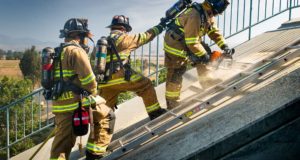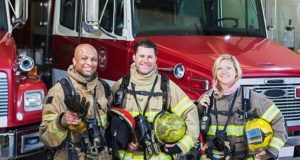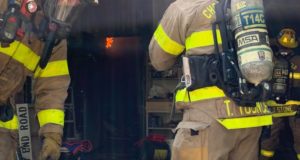By: William Hux, Chief Fire Marshal, Va. State Fire Marshals Office, Va. Fire Marshal Academy Note From Chief Avsec: Another great post from my Guest Blogger, William Hux! Buckle up ’cause it’s gonna be a heck of ride! The author at FDIC 2025 in Indianapolis. Don’t pretend control is the same thing as leadership, it’s not. In the fire service, ...
Read More »Tag Archives: fire department management
Extreme Heat and the “Terrible Twins”: What Fire Service Leaders Should Know
Training and drilling are opportunities to “sharpen the saw”, that is, work on the full range of firefighting and rescue skills necessary to do the job and make sure that everyone is still doing them safely and correctly. It's important to do that training in all weather conditions, yet it's equally important to do so safely, effectively and efficiently, especially during hot weather training.
Read More »America’s Fire Service is not a Family – Opinion
Editor’s Note: The following from my fire service colleague, John Murphy, was originally published on LinkedIn and is presented here with his permission. By: John K. Murphy, Esq., Veteran, PA-C, Chaos Manager and Attorney The American fire service is frequently described using familial language. Firefighters call one another “brothers” and “sisters,” departments are referred to as “families,” and leaders often ...
Read More »Today is National Employee Resource Group Day
By: Stephanie White, Firefighter/Paramedic and Guest Blogger Or at least that’s what my LinkedIn feed is telling me [National Employee Resource Groups Day 2024 was November 17th]. Being in the fire service I’m no stranger to ERGs and the solutions and guidance they provide, but I’m also going to use today to dovetail into a subject that I also know ...
Read More »The Role Industrial/Organizational Psychologists Should have in Fire and EMS Departments
Industrial/organizational psychologists specialize in understanding human behavior within the workplace. They apply psychological principles and research methods to improve various aspects of work environments, including performance, communication, job satisfaction, and safety [1]. Here’s why fire and EMS departments should consider integrating I/O psychologists into their teams.
Read More »Take Full Advantage of Fire’s Diamond Time
In doing some research online regarding firefighter safety, I came across this "oldie but goodie" from one of the legends of the fire service in the U.S., the late Ronny Coleman. For firefighters and officers of a certain age, we grew up with Chief Coleman particularly as we read his classic monthly column in the old Fire Chief Magazine (the hard copy), The Chief's Clipboard. For me, reading that column provided my first real taste of officer development as I'd just been promoted to a company officer position in my department, the Chesterfield (Va.) Fire and EMS Department, nee the Chesterfield Fire Department. This was one such column.
Read More »NFPA 1407: 14 years later, what’s your RIC policy?
In the fourteen years since its initial publication, NFPA 1407 has been a big part of fire departments elevating the "status" of the RIC as a critical fireground task assignment on par with that of search, fire attack, ventilation, and laddering. While this has been a positive step in the right direction regarding firefighter safety, the RIC is a "reactive" approach to firefighter safety. The RIC is in the "background" until something goes wrong (e.g., a firefighter becomes lost, entrapped or otherwise endangered). The presence of the RIC can also provide a false sense of security, especially when the RIC consists of only two firefighters.
Read More »What’s in Your Fire Department’s Behavioral Health “Toolbox?”
Fire departments that are looking to provide an effective behavioral health program for their members would do well to model the approach that the fire service has taken with its tiered response to hazardous materials incidents. They would further serve the best interests of their firefighters by collaborating with mental health clinicians, preferably those at the Specialist Level, just as they would if developing their own hazardous materials response team.
Read More »Researchers should not be developing mental health care strategies for firefighters
And that's why we need to have a field of Fire Psychology that's been developed using fire service leaders and mental health practitioners of all "shapes and sizes" if we are to develop and implement better mental health programs for fire service personnel.
Read More »Developing Mission, Vision, and Value Statements for Your Fire and EMS Department
Developing and communicating a department's mission, vision, and values are important organizational management tools for any fire and EMS department, especially one that's committed to getting the best performance from its members and delivering the best service to its external stakeholders.
Read More » Fire & EMS Leader Pro The job of old firefighters is to teach young firefighters how to become old firefighters!
Fire & EMS Leader Pro The job of old firefighters is to teach young firefighters how to become old firefighters!









